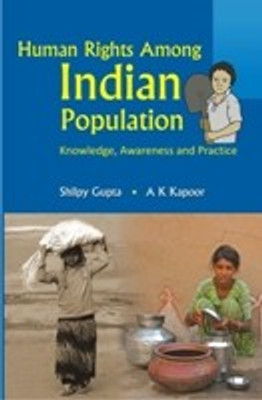Human Rights Among Indian Population 01 Edition(English, Hardcover, Gupta S.)
Quick Overview
Product Price Comparison
The Great Gift Of Classical And Contemporary Human Thoughts To Culture And Civilization Is The Notion Of Human Rights. It Is Important That Different Groups Of Society, Particularly Disadvantages Groups Of Society, Should Be Recipient Of Human Rights. There Are Dissimilar Human Groups Living In Society Who Are In Need Of Protection For Their Human Rights. Separate Laws For Recognition And Enforcement Of Their Human Rights Are Needed To Be Enacted By The State. Much Has Been Said About Human Rights In India By Political Scientists, Legal Experts And Social Scientists But No Specific Work Has Been Carried Out So Far In Various Human Groups. The Present Work Has Been Pursued With An Aim To Visualise The Reality That Exists Today With Special Reference To Various Rights Among Indian Populations.,It Has Been Argued That There Needs To Be A Change In The Paradigm For Evaluating Compliance With The Norms In The Covenant If Human Rights Are To Be Taken Seriously. It Is Time For Non-Governmental Organizations, Governments And Human Rights Monitoring Bodies To Reorient Their Work Towards Identifying And Rectifying Violations, Taking Help From Social Scientists In General And Anthropologists In Particular. The Book Will Be Useful To Legal Experts, Human Rights Activists, Social Scientists, International And National NgoS, Apart From Human Rights Monitoring Bodies, Planners, Law And Social Science Students, General Public And Police Administration.,, Shilpy Gupta Did Her M.Sc. And Ph.D. In Anthropology From University Of Delhi, Delhi (India). Her Areas Of Research Interest Are Human Rights, Medical Anthropology, Ethnicity, Social Change And Cosmo Political Dynamics. She Has Been Awarded Bpr & D Fellowship, Ministry Of Home Affairs, Govt. Of India, New Delhi. She Has Published Several Scholarly Research Papers In National Journals And Participated In Various National Seminars And Workshops. She Has Worked Extensively In Tribal, Rural And Urban Populations Of North India. At Present, She Is Human Rights Activist Based In California, Usa., A.K. Kapoor Is A Voracious Researcher With Diverse Areas Of Interest Ranging From Tribal And Himalayan Studies, Cultural Studies, Cultural Biology To Health Anthropology, Human Rights, Forensic Science And Forensic Anthropology. He Has Carried Out Extensive And Intensive Field Work Among Tribes, Castes, Minority And Religious Groups And Ethnic Groups In Different States Of India Namely Jammu & Kashmir, Himachal Pradesh, Uttarakhand, Uttar Pradesh, Rajasthan, Gujarat, Daman & Diu, Orissa, West Bengal, Kerala, Goa, Haryana, Delhi, Madhya Pradesh, Jharkhand, Punjab, Tamil Nadu, Andaman & Nicobar Islands, And Nepal, North America And United Kingdom. He Has Been The Recipient Of Several Scholarships And Research Grants From Various Research Organisations. He Held Various Academic, Administrative And Professional Positions. He Has Published In Addition To His Nine Books/ Edited Volumes, More Than 170 Research Papers And Articles In National And International Journals. He Has Attended More Than Seventy National And International Seminars, Workshops And Symposiums. He Has Been Awarded Ruchi Award (1991), Ugc Research Award (1999), Life Time Achievement Award (2006), Vidya Ratan Award (2008), And Man Of The Year Award (2009, Gwalior). He Has Been Visiting Fellow In Number Of Universities In India And Abroad. He Has Travelled To North America And European Countries For Academic Activities. He Is Consultant To Many National And International NgoS. He Has Presided Over Various National And International Academic, Cultural And Sports Functions. A. K. Kapoor, Professor Of Anthropology At Delhi University, Delhi, Is At Present Adorning The Office Of Vice-Chancellor Of Jiwaji University, Gwalior (Madhya Pradesh)., Content:- Contents, Preface, 1. Indroduction, 2. Area And People, 3. Methodology And Inter-Cultural Communication, 4. Ethnographic Live, 5. Socio-Economic And Cultural Characteristics Of Tribal, Rural, And Urban Populations, 6. Jurisprudence And Customary Laws, 7. Populations, Police And Human Rights: An Interface, Dimension, 8. Summary, Conclusion And Suggestions, References, Index


